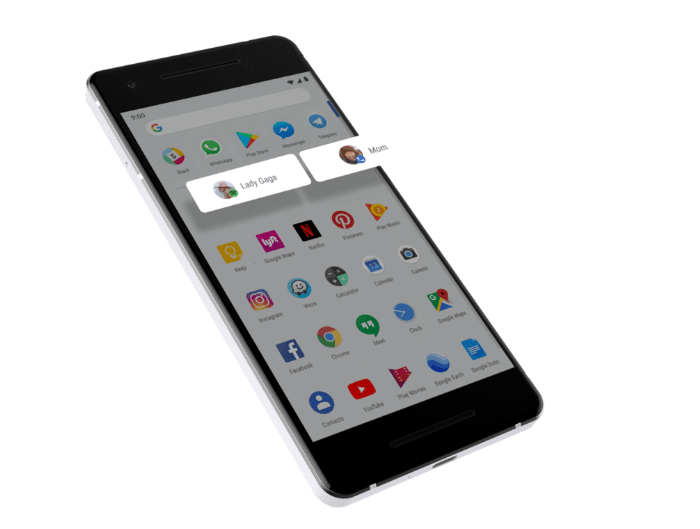Google has finally given the Android 9.0 P a name: Android 9 Pie. After beta testing it for months, the search engine giant has started rolling out the new software to all the Pixel phones. If you own a Pixel device, check if you have received an over-the-air update. If you haven’t yet, you should expect to receive it in the next few days. With Android Pie behind us, Google fans have started speculating what the next year’s Android 10 Q will be named.
It’s not always easy to find the right name
The name Android Pie shouldn’t come as a huge surprise. It was kind of expected. Devices part of Google’s Android Beta program will get the new software later this fall. Sony, HMD Global, Oppo, OnePlus, Vivo, Xiaomi, and Essential had participated in the Android Beta program.
Google follows an alphabetical naming pattern for Android software. So, we know the next year’s software would be called Android 10 Q. Also, the company names its mobile software after something sweet that is recognized across the globe. In the past, we have had Cupcake, Éclair, Froyo, Gingerbread, Honeycomb, Ice Cream Sandwich, Jenny Bean, KitKat, Lollipop, Marshmallow, Nougat, Oreo, and finally Pie.
Naming the software hasn’t always been an easy task for Google. The company considered many names such as Pancake, Pudding, Peppermint, Popsicle, Pop Rocks, Peanut Brittle, Pastry, and Pound Cake before deciding to call this year’s software Android Pie. For Android Oreo and Nougat, the company had turned to the Internet for suggestions.
Possible Android 10 Q names
Things could get a lot more challenging next year with the Android 10 Q. The problem is that there aren’t many popular desserts starting with the letter Q. Google has only a limited number of options. Twitter users could come to the company’s rescue. Here are some possible Android 10 Q names:
- Android 10 Quesadilla
- Android 10 Quinoa (Quesadilla and Quinoa are the most recommended by Twitter users)
- Android 10 Quibble
- Android 10 Quail
- Android 10 Quiche
- Android 10 Qurabia
- Android 10 Quesito
- Android 10 Quindim
- Android 10 Queen of Puddings
- Android 10 Qottab
- Android 10 Quirks
- Android 10 Queijadinha
- Android 10 Quaker Oats
Of course, most of these items originate outside North America and their names do not have a global familiarity. But then Google has limited options. Alternatively, Android 10 could give Google an opportunity to change the naming pattern of its mobile software. There are a lot of possibilities beyond alphabets and desserts.
Android Q name predictions?
I like Quesadilla and Quiche.
— Andrew Martonik (@andrewmartonik) August 6, 2018
Now that @Android P has a name – 'Pie', what will Google call Android Q? ?
Quesadilla? Quinoa?
— Manu Kumar Jain (@manukumarjain) August 7, 2018
Now that Android 9 P is officially called Android Pie…
They're looking for Android 10 Q's name…My bet is on Android Qat ? quite a sweet thing.
— DaMagedArchitect (@Glorious_Crown) August 7, 2018
https://twitter.com/backlon/status/1026517454342643720
I am very happy about the name android PIE…. I was thinking about what will be the name of android q …. may be Quince, Quaker oats, Quartz, Quiche.@Google
— Kaushik Pal (@Kau6ix) August 7, 2018
Dear @Google,
Please make the next @Android Q the 'Android Queijadinha'. ?
Thank you,
João.
— João Gonçalves ?? (@jpmgoncalves) August 7, 2018
Only time will tell what the Android 10 Q would be officially called. Google is expected to announce the software at the next year’s I/O Conference in May. Until then, we have the Android Pie to cherish.
Some features missing from the Android 9 Pie release
The new Android 9 Pie adds native support for display notches, making it easier for apps to work seamlessly on devices that have a display cutout. It also brings AI-powered adaptive battery technology that makes your device more energy-efficient. It prioritizes apps you use frequently while apps you are less likely to re-open are closed in the background to preserve battery life. It also brings gesture-based navigation.
Some of the most anticipated features of Android 9 Pie have not been included in the official release. Google is currently offering them as a beta on Pixel smartphones. These features include Digital Well Being that allows you to see how much time you spend on your phone and within individual apps. It also lets users set a daily time limit on apps.
Google is trying its best to get the latest software on more and more Android devices. Android One is a step in that direction. And it was the main reason Google added devices from Sony, OnePlus, Oppo, Essential, Xiaomi, and HMD Global to the Android Beta program. But it still has a long way to go before it can get the new software on maximum devices quickly. Android Oreo has been around for almost a year, but it powers only 12.1% of active Android devices. By comparison, Apple’s iOS 11 is installed on more than 80% of compatible iPhones and iPads.





